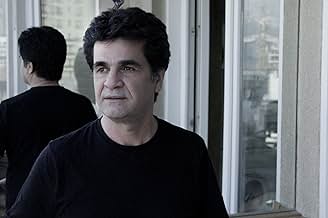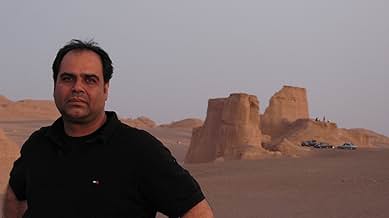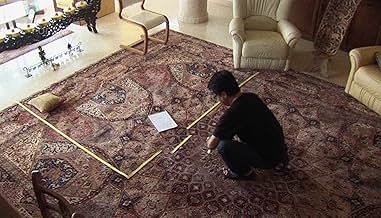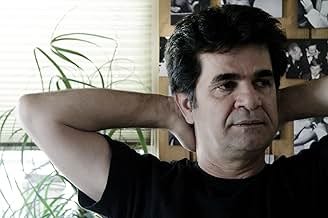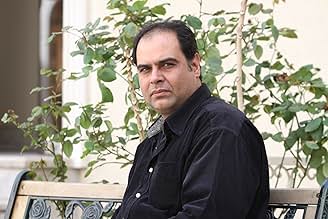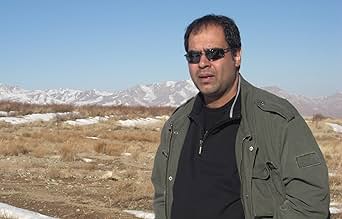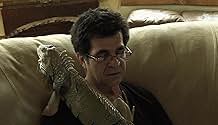IMDb RATING
7.4/10
5.9K
YOUR RATING
It's been months since Jafar Panahi, stuck in jail, has been awaiting a verdict by the appeals court. By depicting a day in his life, Panahi and Mojtaba Mirtahmasb try to portray the depriva... Read allIt's been months since Jafar Panahi, stuck in jail, has been awaiting a verdict by the appeals court. By depicting a day in his life, Panahi and Mojtaba Mirtahmasb try to portray the deprivations looming in contemporary Iranian cinema.It's been months since Jafar Panahi, stuck in jail, has been awaiting a verdict by the appeals court. By depicting a day in his life, Panahi and Mojtaba Mirtahmasb try to portray the deprivations looming in contemporary Iranian cinema.
- Awards
- 10 wins & 14 nominations total
- Directors
- Writer
- All cast & crew
- Production, box office & more at IMDbPro
Featured reviews
I have not seen any of Jafar Panahi's films. I've heard of Crimson Gold through the iconic image on the DVD cover but otherwise I'm not aware of his style. This Is Not A Film would be a great introduction as the filmmaker himself compares how he feels to the characters he created 10 years prior and analyses his own style of filmmaking. As someone who is interested in making films, this is a really fascinating documentary. Essentially a home video turned into a film, where its shown in the film itself when they decided to turn it into a film, it unintentionally breaks down storytelling and storytelling methods as Panahi demonstrates a film idea he has in a pitch like process to the point where he questions why we even need the medium of film. The raw emotion in this doc is compelling despite the fact not a lot happens within its 77 minute running time. In the end, you come to know Panahi and his culture more intimately and it's fascinating how his unintentional documentary style is similar to his fiction filmmaking style, especially with an ending that makes your heart skip a beat. I'll contradict the title, this is one hell of a film.
8/10
8/10
Iranian director Jafar Panahi is one of world's most important movie makers nowadays, while also a victim of the oppressive regime in his country. Arrested, together with other artists, during the events following the Iranian presidential elections in 2009, he spent several months in prison. He was freed then on bail while the judicial procedure against him was going on. Mr. Panahi was eventually sentenced to 6 years of prison and 20 years ban to make movies.
It was during the period spent at home in 2010 that Jafar Panahi made this movie, with the title This is Not a Film (In Film Nist). A friend, documentary producer Mojtaba Mirtahmasb (the author of Lady of the Roses, 2008), came with a consumer-grade camera and shot the footage for a 75 minutes video, having Mr. Panahi as co-director, screenwriter, film editor and star. The video was eventually smuggled outside Iran on a flash drive and screened at the 2011 Cannes Festival.
It's just that: 75 minutes in a day spent by Jafar Panahi at home, waiting for the result of the trial. He talks to the phone with his lawyer, then feeds his pet (who is a very nice iguana), then talks with the cameraman shooting the footage about a project for a new film, rejected by the censorship, memories from some of his movies come and go, suddenly a terrible noise of explosions is heard - it's nothing than fireworks, and Mr. Panahi goes to the window to shoot them with his cell phone.
A movie that is not a movie, says Mr. Panahi. It's just mundane reality. Well, it's not that simple: this movie is a non-movie while this non-movie is a movie. Because it's his reality, his universe, which is sending us to the universe of his movies. All his movies talk actually about him, about his universe, and it becomes obvious here, in this non-movie which carries all the tension between image and reality - reality sublimated in cinematic image. Like Mozart, this moviemaker thinks only in artistic constructions. For Mozart any fact of life was musical sound, musical rhythm, for Panahi every fact of life is cinematic image, cinematic rhythm. Look, even his concerns for the sentence to come become art! However, the strongest association should be made to Beethoven! This moviemaker carries all the tension between reality and art, all his creation is fully aware of the paradoxical relationship between reality and art: reality mirrored in art, art mirrored in reality, art suffering that reality struggles to keep its autonomy, reality suffering that it is taken for art.
It was during the period spent at home in 2010 that Jafar Panahi made this movie, with the title This is Not a Film (In Film Nist). A friend, documentary producer Mojtaba Mirtahmasb (the author of Lady of the Roses, 2008), came with a consumer-grade camera and shot the footage for a 75 minutes video, having Mr. Panahi as co-director, screenwriter, film editor and star. The video was eventually smuggled outside Iran on a flash drive and screened at the 2011 Cannes Festival.
It's just that: 75 minutes in a day spent by Jafar Panahi at home, waiting for the result of the trial. He talks to the phone with his lawyer, then feeds his pet (who is a very nice iguana), then talks with the cameraman shooting the footage about a project for a new film, rejected by the censorship, memories from some of his movies come and go, suddenly a terrible noise of explosions is heard - it's nothing than fireworks, and Mr. Panahi goes to the window to shoot them with his cell phone.
A movie that is not a movie, says Mr. Panahi. It's just mundane reality. Well, it's not that simple: this movie is a non-movie while this non-movie is a movie. Because it's his reality, his universe, which is sending us to the universe of his movies. All his movies talk actually about him, about his universe, and it becomes obvious here, in this non-movie which carries all the tension between image and reality - reality sublimated in cinematic image. Like Mozart, this moviemaker thinks only in artistic constructions. For Mozart any fact of life was musical sound, musical rhythm, for Panahi every fact of life is cinematic image, cinematic rhythm. Look, even his concerns for the sentence to come become art! However, the strongest association should be made to Beethoven! This moviemaker carries all the tension between reality and art, all his creation is fully aware of the paradoxical relationship between reality and art: reality mirrored in art, art mirrored in reality, art suffering that reality struggles to keep its autonomy, reality suffering that it is taken for art.
Whether it's a film or not is irrelevant, it's a fantastic comment on the state of Iranian democracy
This Is Not A Film comes to audiences already with a high level of notoriety. The famous film behind "cakegate", it's constricted production meant that the film was distributed out of Iran on a USB stick concealed inside a birthday cake. It's the kind of screwball scenario you might find on a Judd Apatow movie, but This Is Not A Film is no laughing matter. As the title would assume, this is not so much of a film as it is a film exorcism.
Whilst under house arrest, and pursuing an appeal against a six year prison sentence and 20 year ban from directing, esteemed Iranian auteur Jafar Panahi (The Mirror, Crimson Gold) invites fellow filmmaker Mojtaba Mirtahmasb into his home to crudely document a day in his tormented life.
Shot on a digicam and later an iPhone, we follow Panahi shuffling around his apartment, feeding his daughter's pet iguana, paying the delivery boy for takeaway food, and calling his tenacious attorney trying to get him out of house arrest. At first, it's a minor study of segregation and loneliness, but This Is Not a Film is at it's most enthralling when Panahi expresses his natural directing flare; acting out his latest screenplay from the (dis)comfort of his family living room, discussing camera angles to the most minute detail, and reflecting on how he managed to reach such a raw level of intimacy in his previous works. Whether you are aware of his filmography or not, it's clear that Panahi is an exuberant cinephile, which makes his current, and ongoing battles with the government even more distressing.
If you were forced to judge this meta-commentary diatribe, one could suggest that Panahi and Mirtahmasb fail to present a bigger picture on the crisis of the state's dominance over artistic intent. Similarly to 2006′s female equality drama Offside, This is Not a Film is incredibly subtle with it's political allegories, bordering on the coyly parabolic. Instead of presenting a bigger, ultimately more controversial picture on the crisis of state dominance in the creative industries, Panahi and Mirtahmasb reach a palpable level of verisimilitude in the very smallness of the situation. It all comes together in a final twenty minute sequence where Panahi falls behind the camera and back into storyteller mode (it could cost him his life, but he can't help it). He follows a young dustman around the apartment block and asking him what his plans for the future will be. The cordial apprentice is unsure, but it's hopefully going to be a life less frightening than the one Panahi has been dealt.
This Is Not A Film concludes with harrowing sentiment. With the sound of New Years' Eve fireworks and cheering in the background, the screen fades to black, with the credits and special thanks nods are left blank, followed by a final frame that sets out a humble dedication to all Iranian filmmakers. It may be a non-film but, whatever it is, it's certainly a riveting watch; and has rightly earned a place in the Oscars' documentary award shortlist.
Here in the Western world, our access to information, democratic governments and human rights mean that cinema is taken for granted, and filmmakers have it easy. Whilst we bemoan the extortionate prices of popcorn, Panahi and Mirtahmasb are putting their lives on the line to tell the stories they feel they must tell, in the hope that, one day, their nation will be able to have the same sort of pro-democratic freedom as the rest of us.
www.366movies.com
Whilst under house arrest, and pursuing an appeal against a six year prison sentence and 20 year ban from directing, esteemed Iranian auteur Jafar Panahi (The Mirror, Crimson Gold) invites fellow filmmaker Mojtaba Mirtahmasb into his home to crudely document a day in his tormented life.
Shot on a digicam and later an iPhone, we follow Panahi shuffling around his apartment, feeding his daughter's pet iguana, paying the delivery boy for takeaway food, and calling his tenacious attorney trying to get him out of house arrest. At first, it's a minor study of segregation and loneliness, but This Is Not a Film is at it's most enthralling when Panahi expresses his natural directing flare; acting out his latest screenplay from the (dis)comfort of his family living room, discussing camera angles to the most minute detail, and reflecting on how he managed to reach such a raw level of intimacy in his previous works. Whether you are aware of his filmography or not, it's clear that Panahi is an exuberant cinephile, which makes his current, and ongoing battles with the government even more distressing.
If you were forced to judge this meta-commentary diatribe, one could suggest that Panahi and Mirtahmasb fail to present a bigger picture on the crisis of the state's dominance over artistic intent. Similarly to 2006′s female equality drama Offside, This is Not a Film is incredibly subtle with it's political allegories, bordering on the coyly parabolic. Instead of presenting a bigger, ultimately more controversial picture on the crisis of state dominance in the creative industries, Panahi and Mirtahmasb reach a palpable level of verisimilitude in the very smallness of the situation. It all comes together in a final twenty minute sequence where Panahi falls behind the camera and back into storyteller mode (it could cost him his life, but he can't help it). He follows a young dustman around the apartment block and asking him what his plans for the future will be. The cordial apprentice is unsure, but it's hopefully going to be a life less frightening than the one Panahi has been dealt.
This Is Not A Film concludes with harrowing sentiment. With the sound of New Years' Eve fireworks and cheering in the background, the screen fades to black, with the credits and special thanks nods are left blank, followed by a final frame that sets out a humble dedication to all Iranian filmmakers. It may be a non-film but, whatever it is, it's certainly a riveting watch; and has rightly earned a place in the Oscars' documentary award shortlist.
Here in the Western world, our access to information, democratic governments and human rights mean that cinema is taken for granted, and filmmakers have it easy. Whilst we bemoan the extortionate prices of popcorn, Panahi and Mirtahmasb are putting their lives on the line to tell the stories they feel they must tell, in the hope that, one day, their nation will be able to have the same sort of pro-democratic freedom as the rest of us.
www.366movies.com
I saw "This Is Not A Film" as part of the Ghent filmfestival 2011. Originally the film "Absolutely Tame Is A Horse" of the same director was scheduled. It had to be replaced in the last minute, due to an export ban on the film itself, plus the Iranian distributor loosing his license.
Nearly all 75 minutes that the replacement film takes, are shot within the apartment of the director in question. He is not allowed to make films, but nowhere was forbidden to read a screenplay aloud. On the other hand, as correctly noted by the camera man, recording this reading might still be considered film making. Hence he named this film "This Is Not A film", which may or may not help to evade the issue.
There were fireworks, which we saw announced on TV as non-religious, a different word for Not Allowed. Yet we clearly saw and heard fireworks on several places spread over the neighborhood. Could this be construed as some not-so-silent protest?? We felt a volatile atmosphere around these fireworks, albeit in an indirect way, because everyone seemed worried about their kids and relatives coming home in time. Moreover, when he was talking on the phone with a colleague who was underway, the latter had to discontinue abruptly when stopped by the police. This very apparently was cause for alarm. Later on he phoned back, and reassured us that the police only wanted to check his camera, lying unused on the passenger seat. All such signals combined clearly demonstrated an atmosphere of suppression and fear for the police.
I was prejudiced by some reviews I've read, describing this not-a-film as a bit boring. Having seen it, I found that too harsh. It may apply to the elevator scene, but that was neatly broken up in small scenes providing for some diversion. Within the apartment, a nice intermezzo was created by a pet lizard. It was being fed in the beginning, and then disappeared out of sight for a while. Later on we saw it crawling over our main character (complaining about its sharp nails) and over the couch, to eventually find a resting place in the bookshelves.
Throughout the film I was surprised that someone convicted for 6 years in prison, and a ban to make films for 20 years, was not locked up, but instead having some house arrest while awaiting an appeal. It clearly shows that I know nothing about the Iranian judicial system. Especially, as we learned from a phone call with his attorney, that his conviction was not on a legal basis, but on political grounds only. The latter is a concept very alien to us.
All in all, this not-a-film gave a limited inside view in a country we only know from newspapers. It was also a revealing inside view in an Iranian apartment, larger and better equipped than I had assumed beforehand. We can only speculate how he pays for all this, given the ban on his regular work. It shows (again) how little we know about Iran. My final conclusion is that I did not regret keeping my tickets for this not-a-film, though I was entitled for a substitute at choice out of the festival program.
Nearly all 75 minutes that the replacement film takes, are shot within the apartment of the director in question. He is not allowed to make films, but nowhere was forbidden to read a screenplay aloud. On the other hand, as correctly noted by the camera man, recording this reading might still be considered film making. Hence he named this film "This Is Not A film", which may or may not help to evade the issue.
There were fireworks, which we saw announced on TV as non-religious, a different word for Not Allowed. Yet we clearly saw and heard fireworks on several places spread over the neighborhood. Could this be construed as some not-so-silent protest?? We felt a volatile atmosphere around these fireworks, albeit in an indirect way, because everyone seemed worried about their kids and relatives coming home in time. Moreover, when he was talking on the phone with a colleague who was underway, the latter had to discontinue abruptly when stopped by the police. This very apparently was cause for alarm. Later on he phoned back, and reassured us that the police only wanted to check his camera, lying unused on the passenger seat. All such signals combined clearly demonstrated an atmosphere of suppression and fear for the police.
I was prejudiced by some reviews I've read, describing this not-a-film as a bit boring. Having seen it, I found that too harsh. It may apply to the elevator scene, but that was neatly broken up in small scenes providing for some diversion. Within the apartment, a nice intermezzo was created by a pet lizard. It was being fed in the beginning, and then disappeared out of sight for a while. Later on we saw it crawling over our main character (complaining about its sharp nails) and over the couch, to eventually find a resting place in the bookshelves.
Throughout the film I was surprised that someone convicted for 6 years in prison, and a ban to make films for 20 years, was not locked up, but instead having some house arrest while awaiting an appeal. It clearly shows that I know nothing about the Iranian judicial system. Especially, as we learned from a phone call with his attorney, that his conviction was not on a legal basis, but on political grounds only. The latter is a concept very alien to us.
All in all, this not-a-film gave a limited inside view in a country we only know from newspapers. It was also a revealing inside view in an Iranian apartment, larger and better equipped than I had assumed beforehand. We can only speculate how he pays for all this, given the ban on his regular work. It shows (again) how little we know about Iran. My final conclusion is that I did not regret keeping my tickets for this not-a-film, though I was entitled for a substitute at choice out of the festival program.
A late addition to the Cannes 2011 programme after being smuggled into France inside a cake, Iranian director Jafar Panahi's "This is Not a Film" (2011) is by no means your average political documentary. The 75-minute piece, shot partially on an iPhone, captures the day-to-day life of Panahi during a state-imposed house arrest in his Tehran apartment as he appeals a six year prison sentence and 20 year filmmaking ban for his opposition to the 2011 Iranian elections.
Here in the Western world, our access to information, democratic governments, and human rights are taken for granted. Panahi and Mirtahmasb are putting their lives on the line to tell the stories they feel they must tell, in the hope that, one day, their nation will be able to have the same sort of pro-democratic freedom as the rest of us. Gripping entertainment. Little by little "This Is Not a Film" leads to a final scene of overwhelming power. Anyone interested in cinema and/or Iran owes it to themselves to become familiar with this "not" film.
Here in the Western world, our access to information, democratic governments, and human rights are taken for granted. Panahi and Mirtahmasb are putting their lives on the line to tell the stories they feel they must tell, in the hope that, one day, their nation will be able to have the same sort of pro-democratic freedom as the rest of us. Gripping entertainment. Little by little "This Is Not a Film" leads to a final scene of overwhelming power. Anyone interested in cinema and/or Iran owes it to themselves to become familiar with this "not" film.
Did you know
- TriviaDirector Jafar Panahi was put under house arrest in 2010 and banned from filmmaking for 20 years. This film was smuggled out of Iran on a USB stick hidden in a cake.
- Quotes
Mojtaba Mirtahmasb: It's important that the cameras are ON.
- How long is This Is Not a Film?Powered by Alexa
Details
- Release date
- Country of origin
- Official sites
- Language
- Also known as
- This Is Not a Film
- Filming locations
- Production company
- See more company credits at IMDbPro
Box office
- Gross US & Canada
- $77,016
- Opening weekend US & Canada
- $12,608
- Mar 4, 2012
- Gross worldwide
- $88,758
- Runtime1 hour 15 minutes
- Color
Contribute to this page
Suggest an edit or add missing content


